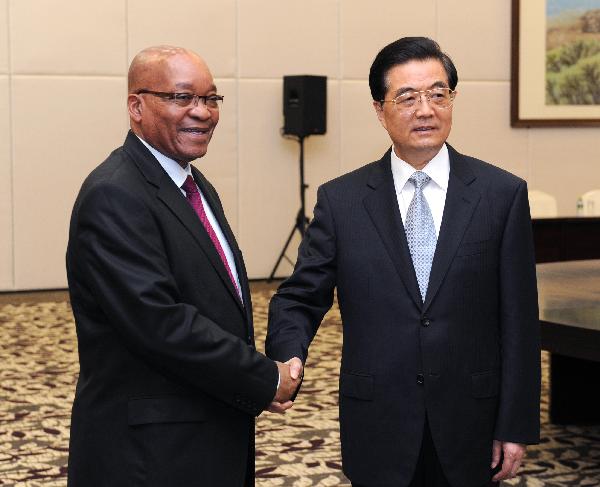Hu calls for immediate Libya cease-fire
China called for an immediate cease-fire in Libya to prevent an even worse humanitarian crisis in the country, President Hu Jintao told visiting South African President Jacob Zuma on Wednesday during their meeting prior to the BRICS Summit, which opens on Thursday.
 |
|
Chinese President Hu Jintao (R) meets with South African President Jacob Zuma in Sanya City, south China's Hainan Province, April 13, 2011. Zuma will attend the BRICS Leaders Meeting here on Thursday. [Wang Ye/Xinhua] |
Hu extended a sincere welcome to South Africa on its joining the BRICS (Brazil, Russia, India, China and South Africa) group, and said that its participation would not only benefit South Africa but also Africa as a whole.
Returning to Libya, Hu said that China is very concerned with the continuing turmoil in the country and the humanitarian crisis there.
China supports the political efforts of all parties, including the African Union, in alleviating the crisis in Libya, Hu said.
He added China is willing to maintain communication and coordination with South Africa on the Libyan issue to help restore stability in the north African country.
While thanking China for its role in helping South Africa join the BRICS, Zuma, who informed his hosts of efforts made by the African Union panel on Libya, said the pressing priority is a cease-fire to give Libya a chance for peace.
The concern of both countries over Libya constitutes a part of their collaboration in international affairs, the two presidents agreed.
Furthering such cooperation is one of the four measures that will deepen the comprehensive strategic partnership between China and South Africa, Hu said.
Hu noted that cooperation between the two countries in international affairs at the United Nations, the World Trade Organization, the G20 and BRICS will help protect the interests of developing countries. Both leaders vowed to continue collaboration in assuring a successful outcome of the United Nations Climate Change Conference to be held in Durban in December.
The other three measures to promote China-South Africa relations include intensifying high-level exchanges, deepening cooperation in infrastructure construction, mining, energy and agriculture and increasing exchanges at cultural and people-to-people levels.
China also hopes to increase investment in major economic sectors in South Africa to promote a balanced and healthy development in trade relations, Hu said.
Echoing Hu's words, Zuma said South Africa is willing to work with China to enhance economic cooperation and boost trade and environmental protection.
Greater cooperation would help South Africa create more job opportunities and boost economic development, Zuma said.
Trade between the two countries in 2010 reached $25.6 billion with a $4 billion surplus on the South African side, China's Ambassador to South Africa Zhong Jianhua said, according to the Ministry of Foreign Affairs website.
China and South Africa cooperate closely in both politics and economics, said Zhang Xiaodong, a researcher with the Institute of West Asian and African Studies under the Chinese Academy of Social Sciences, and deputy chief of the Chinese Association of Middle East Studies.
"South Africa is also a leading representative on the African continent, and its inclusion makes the bloc more comprehensive geographically, as well as more balanced when speaking for emerging economies in the world," Zhang said.
Yang Lihua, a researcher at the Chinese Academy of Social Sciences, said that the bilateral relationship with South Africa is getting even closer since the two countries declared a comprehensive strategic partnership last August.
"We are on track politically and economically, and South Africa's membership into the bloc will further strengthen the relationship," she said.
Yang said South Africa's attendance in the summit will also help the bloc's influence to be felt in the African continent as a whole.
China and Africa established a dialogue mechanism as early as 2000, and the China-Africa cooperation forum served as a good communication channel for the two countries, Yang said.
Zuma's trip to Libya last week was on behalf of the African Union, Yang added. "Africa has always insisted on resolving problems through peaceful means by themselves...however, how much influence can the BRICS have over the Libya situation is very hard to say," she said.
Zhang said it is highly possible that the group will discuss Libya.
Gong Shaopeng, a professor of international politics at China Foreign Affairs University in Beijing, said that Sino-South African ties are developing "very rapidly".
"Diplomatic relations were established just a little more than 10 years ago and now China is already South Africa's biggest trade partner, and that is quite an extraordinary accomplishment," Gong told China Daily.
Gong believes that South Africa will discuss the current situation in Libya with the other four BRICS nations during the summit. Previously, all nations of the bloc, except South Africa, abstained?in a UN vote for imposing a no-fly zone over Libya.
 0
0 






